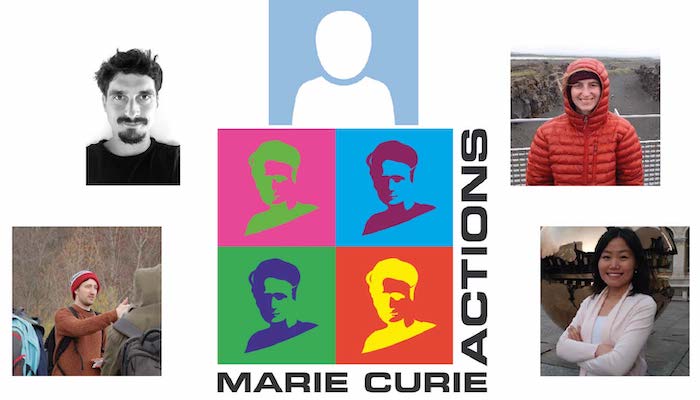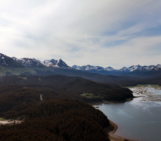
The summer months are often considered the cucumber season both in politics and in academia. However, there are several young researchers who use these months to work like crazy on proposals for the Marie Skłodowska-Curie Actions Postdoctoral Fellowship call. To give some inspiration to these young academic adventurers, I asked some current and recently awarded MSCA Fellows to share their experiences with me about the application process, moving countries, and overall, about their fellowship and its effect on their careers.
Meet the Fellows: Weimu Xu is a Chinese researcher, who is studying deep time paleoclimate and Earth system changes. She was awarded an MSCA Fellowship for the project PALEOCARBON (2019-2023) hosted by the University College Dublin. Madeleine Vickers from the UK specialises in complex interactions driving paleoclimate changes throughout the Phanerozoic. She is currently an MSCA Fellow (2021-2023) at the University of Oslo with her project ICECAP. Phil Heron is a British geodynamicist who was awarded an MSCA Fellowship for the period of 2017-2019 at Durham University with his project TERROPLATE. Marco Scuderi is an Italian researcher, interested in earthquake mechanics, who held an MSCA Fellowship in 2015-2017 at the La Sapienza University of Rome with his project FEAT. Leandro Gallo is an Argentinian paleomagnetist, currently working on his MSCA project TANGO (2021-2023) at the University of Oslo.
The MSCA Postdoctoral Fellowship is a very prestigious and great opportunity for Early Career Scientists (ECS-s) to become more independent and develop their own research. The aim of this fellowship is to foster excellence research and to help early career scientists gain experience in other countries, disciplines, and non-academic sectors1. Indeed, the mobility aspect is one of the most prominent criteria of this grant. Leandro, from Argentina, explained to me that for ECS from Latin America this is an unmatched opportunity: “Mobility has been challenging throughout my career as funding is scarce in Argentina. During my Ph.D., I have always worked within research groups from Argentina. I had my first opportunity to attend an international meeting during my first postdoc, after securing funding from the conference organizers. This attendance became a pivotal step in my academic path and allowed me to meet my current MSCA supervisor and long-term collaborator”. Moving to a new country can be challenging, but it can be also highly rewarding by shaping your scientific and social skills. Madeleine exploits the mobility aspect to its maximum; in addition to moving to Norway for her postdoc, she also has two secondary institutes (Utrecht and ETH) where she spends some time during her fellowship to develop new skills. Others, like Marco and Phil, used this opportunity to return home after spending some years abroad. Phil elaborates: “I made the mobility work to my advantage – I’d been out of the UK for 10+ years and wanted to return home. So, it was a deliberate decision to go to Durham – that and to work with Jeroen van Hunen! As everyone knows, the mobility in academia is not great for everyone. I have been very lucky in that I have only moved places where we have some family support – otherwise I would likely be doing other employment”. The moving criteria also allow you to apply to the same country where you currently reside, as long as you apply within a year of moving there. Weimu, for example, was already in Ireland when writing the application, while still meeting the mobility eligibility.
I, myself, once attempted to apply for the MSCA Global Fellowship, and I was told that I should think about it not just as a scientific proposal, but also as a job interview. One has to show why they have chosen their host institution, how their project will fit in with the institution, as well as what can the host institution provide to further their career in research. Hence working together with the supervisors and experts from the host institute can be beneficial. I asked our fellows about the support they received during the application:
Weimu: “I have discussed with the supervisor about the project and they commented on the application draft. After the application, the supervisor provided help with getting the administrative part done (e.g. grant registration and issuing the contract), relevant research training and support for me to carry out the research, and valuable advice on my career progression.”
Madeleine: “I attended a course on how to write a MSCA fellowship proposal, at my previous institution, which helped immensely. The host institution provided all the necessary administration help and paperwork for the fellowship, and in particular, the supervisor helped immensely with setting up the proposal.”
Phil: “Durham University had a pot of money for ‘developing grant applications. So, we applied for this funding to send me to Durham to work on the application with my supervisor. Since meeting Jeroen in 2015 it was another year and a half until submitting the application, including a full month of work to actually get the application in a good position. The role of the host institution is really important – there are so many things you simply can’t do as the applicant of this grant… in particular, you can’t even submit it yourself! Even though you have written it, you’ll have to get your supervisor to do it! Another huge help was from a friend who had previously received a really highly rated MSCA IF (Individual fellowship) in the field of Chemistry. I was able to study their application like it was some sort of ancient scroll, and mimic the way in which they had presented their information clearly and concisely (despite it not being in my field at all).”
Marco: “I was in touch with the supervisor before starting the writing process. Once I had formulated the hypothesis to build a project and basically wrote it, he helped me quite a lot in making it appealing and in line with the guidelines. Since Prof. Collettini won an ERC a few years before my MSCA, he knew the nuts and bolts on how to write a successful proposal.”
Leandro: “I got used to the idea of applying for the grant one year before the call and started writing at least 5 months before the deadline. I was advised to do so to secure some extra time to take advantage of the additional resources that might be available from the University to help the applicants in perfecting their proposals. These resources included application-writing and technical support; as well as contact and follow-up by the Faculty’s EU-support team. Once I got admitted to the fellowship, I was assisted by the EU-office at UiO with the Grant Agreement process with the European Commission. All EU-contracts are signed with the University as a contract partner and must be authorized and signed by the University Director through the EU’s electronic Funding & Tender Portal.”
I think we can conclude, that one needs to take the time to have a well-written proposal, which will be a co-product of the applicant, the supervisor, and the host institution. Studying successful proposals can highlight the intricacies that make a good proposal into a great proposal. So, yes; it is a lot of work, and the success rate is not high, but once victorious, the rewards are high! Although the Postdoctoral Fellowship is usually only 2 years (arguably a bit too short) all the fellows highlighted how important this grant can be for their future, as they can “develop their own research and ideas in complete freedom and supported by a very good financial stability” (Marco).
Here are a few final words by the Fellows: “I think it is safe to say that the MSCA Fellowship is the only reason I have a permanent position today. I was allowed to think about my own research program and develop my own ideas over the period of two years. I was independent and doing an academic job but without any of the admin and service that is required ” (Phil); “I had the chance to work at my project and develop what I liked. This is very important to make you an independent researcher and makes you grow up a lot. Secondly, the MSCA prepared me for the next step that has been the ERC starting grant that I was awarded this year. I believe that writing the MSCA provided the basis to be successful in applying for the next level grants” (Marco); “It is a prestigious fellowship, which provides me the opportunity to carry out my own independent research and it is good for my CV in terms of funding track record. I have since obtained an academic position, which I will start after the end of the fellowship” (Weimu); “The hardest thing is fitting everything I want to do on the project into two years. It is partly because there is so just much exciting science I want to work on” (Madeleine); “The MSCA fellowship is giving me the unique opportunity to interact with the leading experts in my field and focus full-time on my research” (Leandro).
1 https://marie-sklodowska-curie-actions.ec.europa.eu/actions/postdoctoral-fellowships




